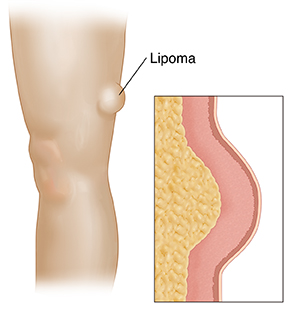Understanding a Lipoma
A lipoma is a lump under the skin that’s made of fat. It’s not cancer (benign). It feels soft like rubber when you press it, and in most cases it doesn’t hurt. Some people have more than 1. A lipoma grows slowly over time and doesn’t cause many problems. Lipomas can occur at any age but most are seen in adults from ages 40 to 60. They are more common in men.

How to say it
li-POH-mah
What causes a lipoma?
The cause of lipomas is not clearly understood. Lipomas are a slow-growing benign (noncancerous) tumor that form from fat cells. Lipomas are considered the most common noncancerous tumor in adults. They may be partly caused by a problem in a gene. They can run in families. Familial multiple lipomatosis is when 2 or more family members have many lipomas.
Symptoms of a lipoma
The main symptom of a lipoma is a soft lump under the skin that doesn’t hurt unless it's pressing on a nerve. It may be small, around 1/4 inch across. Or it may be larger, up to 4 inches across or more.
There are different kinds of lipomas. The most common kind occurs under the skin of the shoulders, chest, back, belly, or under the arms. In some cases, a lipoma can occur on the legs. In rare cases, 1 may occur deeper in the body or in a muscle.
Treatment for a lipoma
In most cases, a lipoma doesn’t need treatment. Your healthcare provider may look at it during regular checkups to see if it changes.
But if the lipoma is painful or you don't like how it looks, it can be removed with surgery. The surgery is called excision. Small lipomas tend not to grow back after surgery. Large lesions may slowly regrow if they can't be fully removed. During surgery, the area around the lipoma is numbed. If you have a deep lipoma, you may need medicine to numb a larger area (regional anesthesia). Or you may need medicine to put you to sleep during the procedure (general anesthesia). Then the healthcare provider makes a cut over the area of the lipoma. They remove the lump of fat. The cut is then closed with stitches.
Possible complications of a lipoma
A large lipoma inside the body can press on organs, nerves, or other tissues and cause problems. For instance, it can cause problems with breathing or digestion.
Living with a lipoma
Your healthcare provider may look at the lipoma during regular checkups to see if it changes or is causing problems.
When to call your healthcare provider
Call your healthcare provider right away if you have any of these: